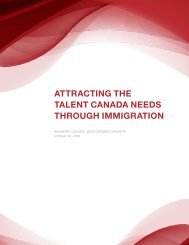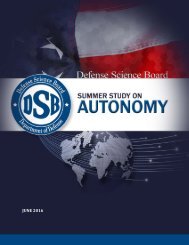Machine learning
machine-learning-conference-report
machine-learning-conference-report
Create successful ePaper yourself
Turn your PDF publications into a flip-book with our unique Google optimized e-Paper software.
Another large dataset being created by NHS England<br />
is that of up to 100,000 human genomes sequences by<br />
Genomics England. As sequencing becomes cheaper,<br />
it is no longer data collection that is the problem, but<br />
its interpretation. Again there is a role for machine<br />
<strong>learning</strong> to support the developing fields of personalised<br />
medicine and theranostics, where treatment is targeted<br />
to the specific needs of the patient.<br />
The unique combination of the NHS’ 55 million patient<br />
records and our expertise in life science gives the UK<br />
a huge opportunity to become the world leader in this<br />
field, believed Grant.<br />
Control, understanding, regulation and acceptance<br />
As machine <strong>learning</strong> becomes established in more areas,<br />
questions about quality control and certification arise.<br />
Depending on the dataset and task, machine <strong>learning</strong><br />
can already provide very reliable answers, e.g. in object<br />
recognition. However, as these techniques are applied<br />
more broadly, certifiable levels of accuracy may be<br />
needed, e.g. in clinical diagnosis or chemical analysis.<br />
As the examples of image recognition software given by<br />
Hinton and Thompson suggest, greater understanding<br />
of how methods such as deep neural networks work and<br />
come to decisions is one area of investigation.<br />
Developments in understanding how and why machines<br />
come to decisions will not only lead to technical<br />
advancements but help humans tolerate and accept<br />
them when working in collaboration.<br />
Jennings believed that standards organisations may<br />
arise to accredit accuracy with stamps of approval but<br />
he felt that these would function at the system level<br />
and not at the level of individual machine <strong>learning</strong><br />
algorithms themselves.<br />
Public resistance to machine <strong>learning</strong>, especially in<br />
an application such as healthcare, may arise from a<br />
misunderstanding about “black-box” decision making,<br />
suggested Bishop, even if the machine is more accurate<br />
than a human. Fears about big data, privacy and ethics<br />
will also be present as training machine <strong>learning</strong><br />
algorithms will require using data from which personal<br />
and sensitive information can be derived. You “can’t<br />
just do anything” with the data, observed Thompson,<br />
as it needs to be treated “with great respect.” However,<br />
although sharing personal data with technology<br />
companies will raise “suspicions”, Grant believed that<br />
successful introduction of machine <strong>learning</strong> in one field,<br />
e.g. driverless cars, will lead to greater public acceptance<br />
in others, e.g. healthcare.<br />
The longer-term future<br />
The recent advancements in software, hardware and<br />
the access to large datasets upon which algorithms can<br />
be trained is rapidly accelerating progress in machine<br />
<strong>learning</strong> and intelligence. A recent survey of leading<br />
experts in artificial intelligence, carried out by Professor<br />
Nick Bostrom and co-workers at the University of<br />
Oxford’s Future of Humanity Institute, found that half<br />
believed human level machine intelligence could be<br />
with us by 2050.<br />
“The transition to the machine intelligence era<br />
is of momentous significance… it’s the last<br />
invention we’d ever need to make”<br />
Professor Nick Bostrom, The University of Oxford.<br />
<strong>Machine</strong>s who are intelligent and curious could identify<br />
interesting areas of enquiry to aid human analysis, and<br />
may even be better at science than humans themselves,<br />
Bostrom explained. Solutions to complex and intractable<br />
scientific challenges which require analysis of big data,<br />
such as climate change or particle physics, may be<br />
beyond the capability of a human lifetime, and artificial<br />
intelligence, Hassabis suggested, will be employed as a<br />
“meta-solution” to help us.<br />
It may be that artificial intelligence ends up being able<br />
to do science better than humans, making it the last<br />
great technological advancement we ever make. Given<br />
the implications of such “superintelligent” machines,<br />
Bostrom believed a field of enquiry around the “control<br />
problem” of artificial intelligence must be established<br />
as part of long term scenario planning. In part, this may<br />
involve ethics boards overseeing responsible use, such<br />
as that created by Google DeepMind, but will also need<br />
collaboration between the leading minds in mathematics<br />
and computer science, both in industry and academia.<br />
<strong>Machine</strong> <strong>learning</strong> report – Conference report 15




